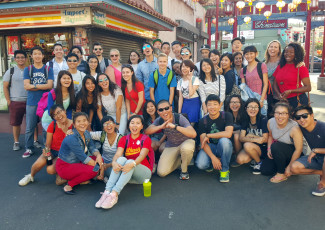Internationalizing Community Colleges
By Jackson N. Sasser
November 4, 2014
As we prepare students to compete in an increasingly global workforce, international education needs to become a priority on campus.
We are reminded daily of the importance of world affairs. Ebola. ISIS. China overtaking the United States as the world’s largest economy. We care about these matters as much as we care about roads, taxes and other local concerns — which is why our community college students should learn about them, too.
Santa Fe College in Gainesville, Fla., has long recognized the importance of internationalism. After 9/11, we launched our international initiative for reasons that hold true today: Conflict is less likely when individuals from different cultures take the opportunity to learn from one another.
International experience for all
For our students to succeed in today’s globalized society and economy, community colleges need to weave international perspectives into every program. That way, all of our students — whether they are from our local community, out of state or across an ocean — can have an international experience.
Each course, regardless of where it resides in the curriculum, can include an international component. And every service should ensure that every student — domestic or foreign — feels at home, here and in the world beyond the classroom.
In 2001, Santa Fe College had one foreign language, one study abroad program and an international student center. Today we offer five languages and study abroad trips to Africa, Asia, Central and South America, and Europe. We have had four Fulbright Scholars-in-Residence: one from China, one from Brazil and two from Indonesia. All of this came from a proactive effort to place internationalism at the heart of our programs and at the center of the college’s goals.
Part of the community college mission
In the higher education space, we often see universities leading international work. But with community colleges’ open enrollment, ethnic and cultural diversity, workforce orientation and commitment to improving society, we are natural proponents of global education.
Just three years after beginning our initiative, we were awarded an Andrew Heiskell Award for internationalizing our campus, a prestigious honor largely bestowed on universities. And our work has not stopped:
- Santa Fe recently added an international certificate that requires students to fulfill an international experience outside the classroom.
- We’ve established partnerships with universities in China and Brazil that feature faculty exchanges.
- Students in a sociology class regularly Skype with students at a college in Orebro, Sweden.
- We’re offering more courses in Chinese and Asian area studies as a result of our two-year “Opening Doors to Asia” grant from the U.S. Department of Education.
- We’ve introduced an international film festival because art and the dialogues it engenders transcend languages and borders.
Understanding other cultures is as pragmatic as it is enlightening — it is necessary for our students’ success in the world marketplace. We know that national security and economic security are one and the same, and we cannot separate our economy from the global economy.
World affairs are of great importance to the American people, and community colleges are the people’s colleges. Join us in making your college an institution for the community, the state and the world.
Share the ways you are internationalizing your community college in the Comments.









